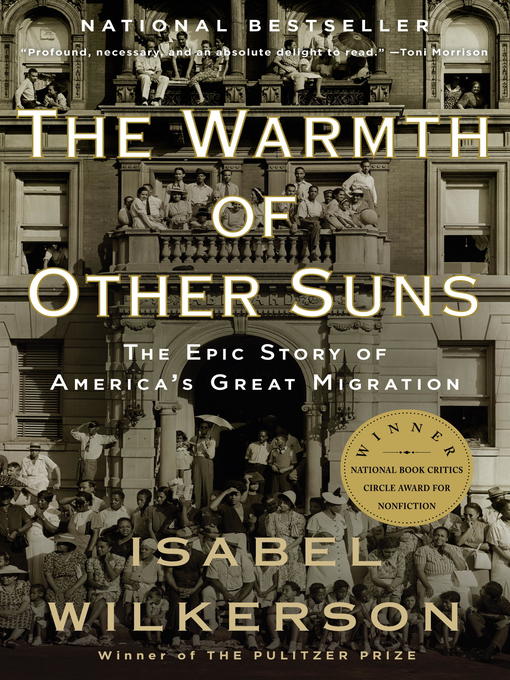0 of 9 copies available
Wait time: About 9 weeks
0 of 9 copies available
Wait time: About 9 weeks
“A brilliant and stirring epic . . . Ms. Wilkerson does for the Great Migration what John Steinbeck did for the Okies in his fiction masterpiece, The Grapes of Wrath; she humanizes history, giving it emotional and psychological depth.”—John Stauffer, The Wall Street Journal
“What she’s done with these oral histories is stow memory in amber.”—Lynell George, Los Angeles Times
WINNER: The Mark Lynton History Prize • The Anisfield-Wolf Award for Nonfiction • The Chicago Tribune Heartland Prize • The Hurston-Wright Award for Nonfiction • The Hillman Prize for Book Journalism • NAACP Image Award for Best Literary Debut • Stephen Ambrose Oral History Prize
FINALIST: The PEN/John Kenneth Galbraith Award for Nonfiction • Dayton Literary Peace Prize
ONE OF THE TEN BEST BOOKS OF THE YEAR: The New York Times • USA Today • Publishers Weekly • O: The Oprah Magazine • Salon • Newsday • The Daily Beast
ONE OF THE BEST BOOKS OF THE YEAR: The New Yorker • The Washington Post • The Economist •Boston Globe • San Francisco Chronicle • Chicago Tribune • Entertainment Weekly • Philadelphia Inquirer • The Guardian • The Seattle Times • St. Louis Post-Dispatch • The Christian Science Monitor
In this beautifully written masterwork, Pulitzer Prize–winning author Isabel Wilkerson presents a definitive and dramatic account of one of the great untold stories of American history: the Great Migration of six million Black citizens who fled the South for the North and West in search of a better life, from World War I to 1970.
Wilkerson tells this interwoven story through the lives of three unforgettable protagonists: Ida Mae Gladney, a sharecropper’s wife, who in 1937 fled Mississippi for Chicago; sharp and quick-tempered George Starling, who in 1945 fled Florida for Harlem, and Robert Foster, a surgeon who left Louisiana in 1953 in hopes of making it in California.
Wilkerson brilliantly captures their first treacherous cross-country journeys by car and train and their new lives in colonies in the New World. The Warmth of Other Suns is a bold, remarkable, and riveting work, a superb account of an “unrecognized immigration” within our own land. Through the breadth of its narrative, the beauty of the writing, the depth of its research, and the fullness of the people and lives portrayed herein, this book is a modern classic.
-
Creators
-
Publisher
-
Awards
-
Release date
September 7, 2010 -
Formats
-
Kindle Book
-
OverDrive Read
- ISBN: 9780679604075
-
EPUB ebook
- ISBN: 9780679604075
- File size: 1510 KB
-
-
Languages
- English
-
Levels
- Lexile® Measure: 1160
- Text Difficulty: 8-9
-
Reviews

Loading
Formats
- Kindle Book
- OverDrive Read
- EPUB ebook
Languages
- English
Levels
- Lexile® Measure:1160
- Text Difficulty:8-9
Loading
Why is availability limited?
×Availability can change throughout the month based on the library's budget. You can still place a hold on the title, and your hold will be automatically filled as soon as the title is available again.
The Kindle Book format for this title is not supported on:
×Read-along ebook
×The OverDrive Read format of this ebook has professional narration that plays while you read in your browser. Learn more here.
